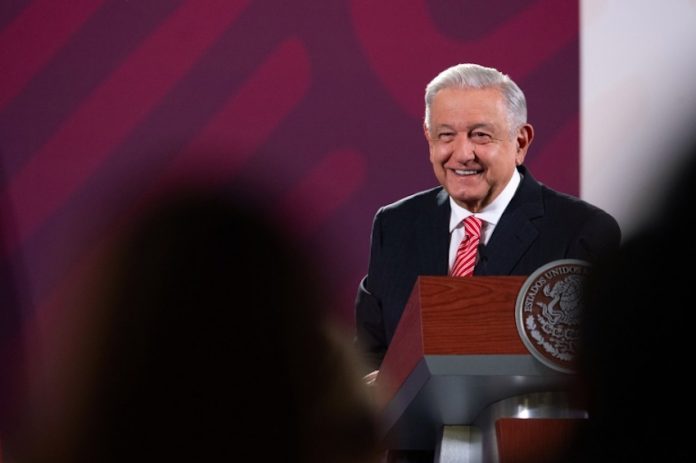The discovery of a pre-Columbian tomb in Chiapas, the kidnapping of a Michoacán mayor, Marcelo Ebrard’s dissatisfaction with the ruling Morena party’s presidential candidate selection process, the presence of large numbers of gringos in Mexico City, lithium mining concessions, violence in Nuevo León and “vile propaganda” from United States politicians were among the topics discussed at this week’s morning press conferences, or “mañaneras”.
President López Obrador also spoke at length about the government’s investigation into the abduction and presumed murder of 43 students in Guerrero, who disappeared nine years ago this week.
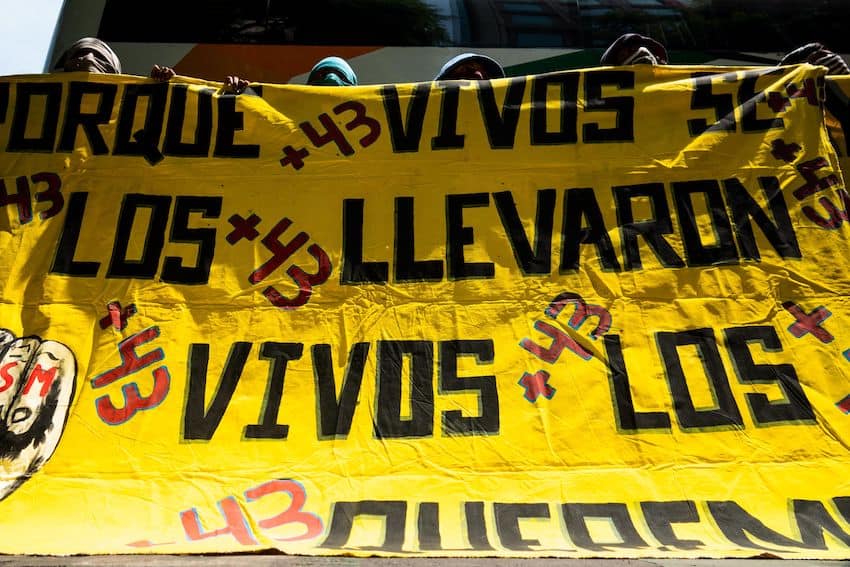
The government released a new report on the Ayotzinapa case on Tuesday, but there are still many unanswered questions, including a particularly crucial one: “Where are the young men?”
AMLO acknowledged that the parents of the students have misgivings about his government’s investigation, but declared that “whether they believe us or not, we’re going to continue because it’s a matter that has to do with our convictions and conscience.”
Monday
During an update on archaeological work along the route of the Maya Train railroad, the director general of the National Institute of Anthropology and History (INAH) announced that a pre-Columbian tomb of an “important person” was discovered on Sept. 11, next to the site where a Maya Train hotel is being built in Palenque, Chiapas.
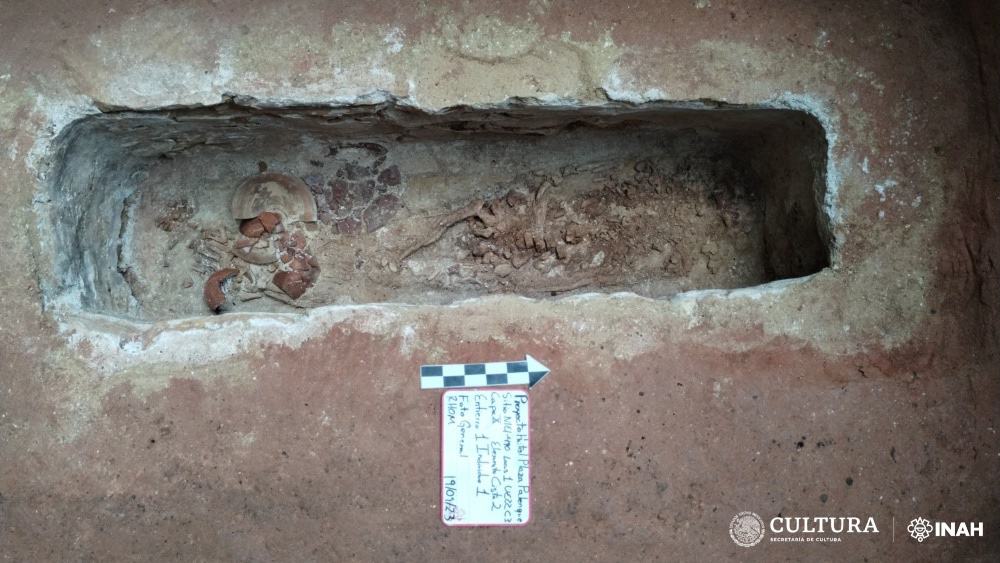
An “offering” of three ceramic vessels was found alongside human remains, Diego Prieto Hernández told reporters.
He said that a structure was “built on purpose to contain the tomb” and that the “dedication” that had evidently gone into it indicated that the deceased was “an important person for the community that settled on the site,” located approximately two kilometers from the ancient Maya city of Palenque.
“… As soon as the excavation is finished and physical anthropology studies have been carried out more information about the person who was buried in this structure will be provided,” the INAH chief said.
Before opening the floor to questions, López Obrador acknowledged that a convoy of vehicles transporting Sinaloa Cartel gunmen arrived last Saturday in southern Chiapas.
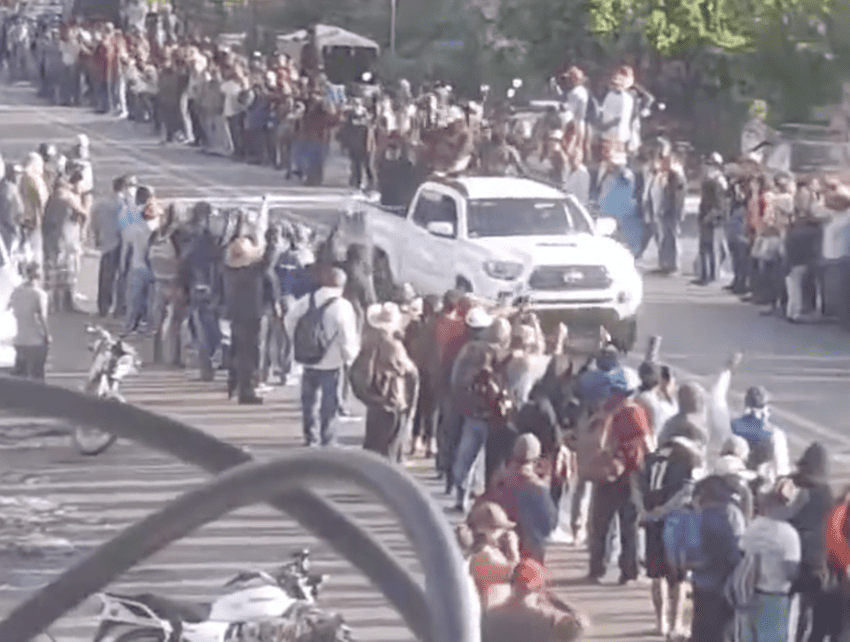
“In Chiapas, on the border with Guatemala, … there are organized crime groups that are allegedly fighting for territory in order to have space to … [move] drugs that come in from Central America, to have control over that territory,” he said.
“And unfortunately they clash [but] there haven’t been a lot of murders in Chiapas in general,” López Obrador said.
“…There has been a lot of propaganda,” he said, making an apparent reference to material posted online by cartels to demonstrate their strength.
“So they brought out a video in which 20 pickup trucks are going into Frontera Comalapa and people on both sides of the highway are apparently welcoming them,” López Obrador said before asserting that opponents of his government – “the conservatives” – are responsible for disseminating the footage and making it go “viral.”
He said the government was attending to the situation in Chiapas and noted that he had ordered an additional deployment of National Guard troops to the border region.
Responding to a question about migration – a hot topic due to the large numbers of people currently passing through the country en route to the United States – AMLO said there are two main reasons why people decide to leave their homes.
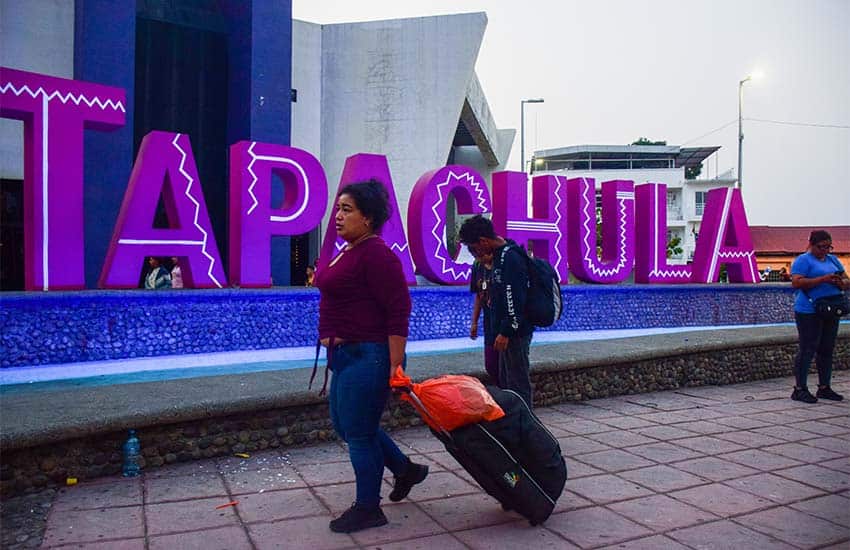
“It’s the lack of opportunities for employment, … for wellbeing and a lot of people also flee their countries due to violence – they’re the two things. So we have to attend to this,” he said.
“I’m going to talk about that in my next meeting with President Biden,” López Obrador said. “… The UN should put together a global plan to combat poverty,” he added.
The president later highlighted that public investment is benefiting Mexico’s south and southeast, a part of the country large numbers of people have left over the years due to a lack of work opportunities.
“Why do we have more growth in the southeast than in the north and the center? Due to public investment, because in 2018 public investment was 500 billion pesos and this year it’s one trillion [US $57 billion] – double,” AMLO said.
Among other remarks, López Obrador rejected a study that found that cartels are collectively the fifth largest employer in Mexico and announced that the Defense Ministry has offered to provide security to 2024 presidential election candidates Xóchitl Gálvez and Claudia Sheinbaum.
“We have to guarantee their protection … and avoid tragedies,” he said, explaining that the government must act “cautiously” as election season approaches.
Tuesday
Before responding to reporters’ questions, AMLO noted that he was informed at his early morning security meeting that the mayor of a Michoacán municipality who was kidnapped in Guadalajara last Saturday had been released.
He said that the mayor, Yolanda Sánchez Figueroa, was on her way back to Cotija, Michoacán, in the company of National Guard personnel.
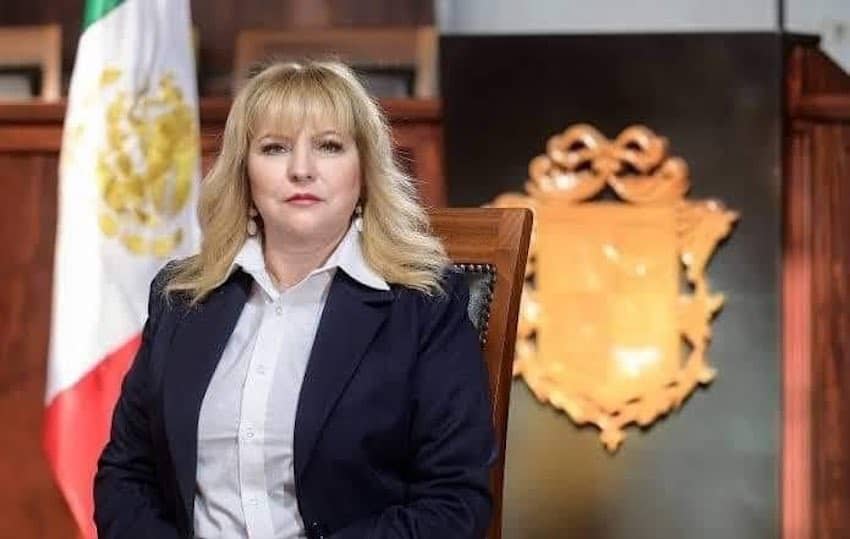
On the ninth anniversary of the disappearance in Guerrero of the 43 Ayotzinapa Rural Teachers College students, López Obrador was asked why it has been so difficult to find out what happened to the young men.
“We’re doing a thorough, serious investigation and we’re making progress,” AMLO responded.
“The mistake of hiding the truth and disposing of evidence was made, the mistake of imposing what was called a ‘pact of silence,'” he said.

“So we’re confronting all of that and we’ve made a lot of progress,” López Obrador said.
He acknowledged that the parents of the students “insist that the army isn’t cooperating” with the investigation, claiming “that it doesn’t want the facts to be known.”
AMLO said he didn’t agree with that view because the army, which is accused of involvement in the crime, “has handed over all the information it has and has helped a lot to clear up … the terrible Ayotzinapa case.”
López Obrador noted that a lawyer for the parents of the young men, with whom he met on Monday, described information presented by his administration about the case as similar to the widely criticized “historical truth” that the previous government put forward as the definitive version of events.
“I don’t share that point of view,” said AMLO, who subsequently announced that text messages related to the case that the Mexican government obtained from its United States counterpart would be made public later in the day.
He said later in the presser that the government’s priority is to “find the young men.”

“The information we already have and that which we could soon obtain might lead us to that,” López Obrador said.
“It’s not about blaming [someone] for the sake of blaming. It’s not just, ‘It was the state and it was the army’ and that’s it. No, we’re going to find out the truth about what happened. I’m not going to lie nor are we going to fabricate something that isn’t true. We’re going to act with rectitude, we’re not the same [as previous governments],” he said.
After a lengthy discussion on the Ayotzinapa case, López Obrador declared shortly before the end of the press conference that the situation in the border region of Chiapas had normalized.
“The National Guard is already there,” he said, adding that steps were being taken so that Federal Electricity Commission workers could go into communities to restore power service that was allegedly cut by cartel members.
“Everything is normal,” AMLO said after a reporter inquired whether food was available in the region and students had returned to school.
“All the blockades have now been removed,” he added.
López Obrador accepted that organized crime groups may have “social bases” among residents of the southern border region, but claimed that support was limited given that the government is attending to “social problems” and “young people, which wasn’t done before.”
“What did … [governments] do for young people before? Nothing. Call them ‘ninis’,” he said, using a pejorative colloquial term for people who don’t have a job and aren’t studying.
“That mustn’t be forgotten,” López Obrador said.
Wednesday
At the beginning of his engagement with reporters, AMLO fielded a question about former foreign affairs minister Marcelo Ebrard’s decision to ask the Federal Electoral Tribunal to intervene in his case against the presidential candidate selection process conducted by the ruling Morena party.
“Nothing, nothing, nothing,” López Obrador responded when asked whether he had any opinion on the matter.
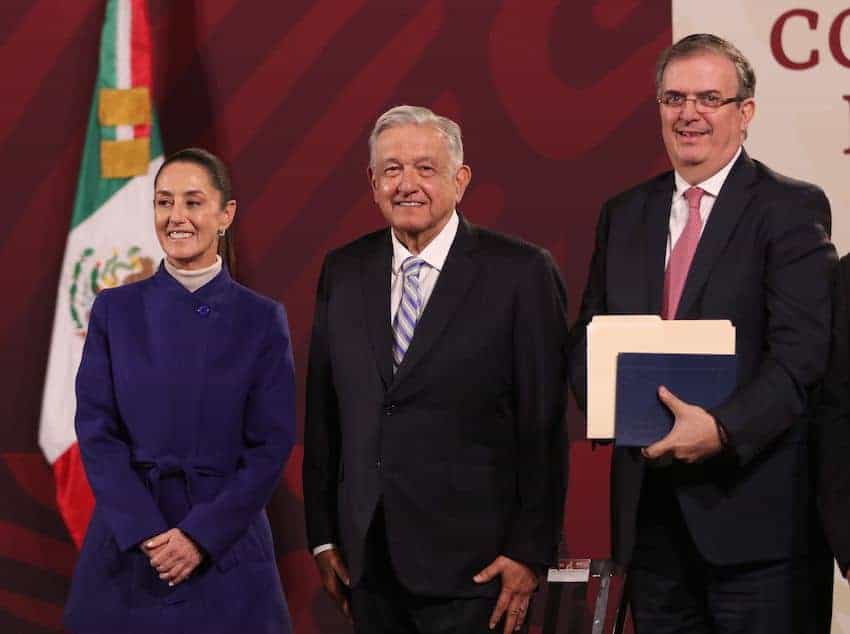
“There are legal procedures and there are freedoms, that’s all I can say,” he said.
“I already finished [my tenure] as leader of the movement of transformation,” AMLO added, referring to Morena. “I already handed over … the baton of command.”
López Obrador switched on his internal autopilot and reiterated his commitment to fighting corruption when a reporter raised a case involving an embezzlement scheme allegedly linked to former Veracruz governor Miguel Ángel Yunes.

“We have to moralize the public life of the country, purify the public life of the country,” he said.
“We also have to continue combating corruption, not just for moral reasons but also because a lot of money can be recovered and saved for the development of Mexico,” AMLO said.
“Mexico’s main problem was corruption, that’s why we didn’t make progress … so we can’t make a truce with corruption. … It’s the plague, I’ve said it many times, it’s what damaged Mexico the most during a long period of time. Corruption is the main cause of economic and social inequality in the country,” he said.
López Obrador sought to clarify his remarks, saying that “there was no corruption in pre-Hispanic Mexico,” but the scourge “arrived with the invaders.”
Later in the presser, AMLO said that a “kind of competition” is taking place in the United States in which people aspiring to elected office, including those seeking to represent the Republican Party at next year’s presidential election, compete with each other to see who can make the “most daring” threat toward Mexico.
“What should we do? Well, don’t take those declarations seriously – they’re nonsense,” he said. “… It’s politicking, not politics.”
López Obrador segued into an attack on the media, describing it as a “power of control and manipulation.”
He advised Mexicans to use social media to inform U.S. citizens and people around the world “what Mexico is,” explaining that “if our country was how the media in the United States depicts it … nobody would come to live in Mexico City.”
“[But the city] is full of Americans, that didn’t happen before. Now you go to a restaurant in La Roma, Colonia Del Valle, Polanco [or] Condesa – those who go to restaurants tell me – and half the tables are taken by Americans, and people even complain that prices have gone up,” AMLO said.
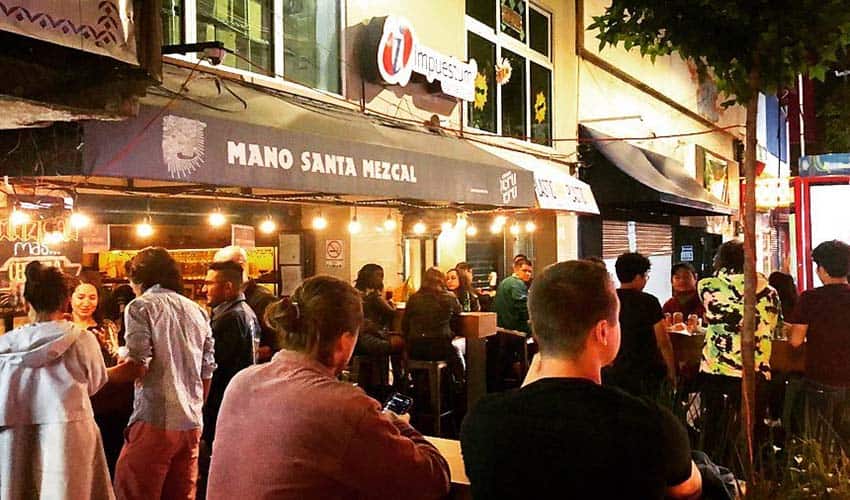
“… There were a lot of them in the Zócalo for the Cry of Independence. And we’re pleased that they participate, that they integrate themselves into the life of Mexico, they’re welcome, but we have to inform United States citizens about what is really happening [in Mexico] so that those political campaigns based on lies and slander…don’t make progress,” he said.
Near the end of his midweek mañanera, López Obrador acknowledged that Tuesday was a bad day for violence, “especially in Nuevo León,” where 12 human heads and other body parts were dumped at different locations across the Monterrey metropolitan area.
Before concluding the presser, he reaffirmed his commitment to continuing the Ayotzinapa case investigation “until we know the truth and the most important thing – where the young men are.”
AMLO said that the parents of the students “have every right” to disagree with the government’s findings, “but regardless of whether they believe us or not, we’re going to continue [the investigation] because it’s a matter that has to do with our convictions and conscience.”
Thursday
“We are taking action on both cases,” López Obrador said after a reporter mentioned fiery narco-blockades in Nuevo León on Wednesday and the murder a day earlier of a Federal Attorney General’s Office official in Chiapas.
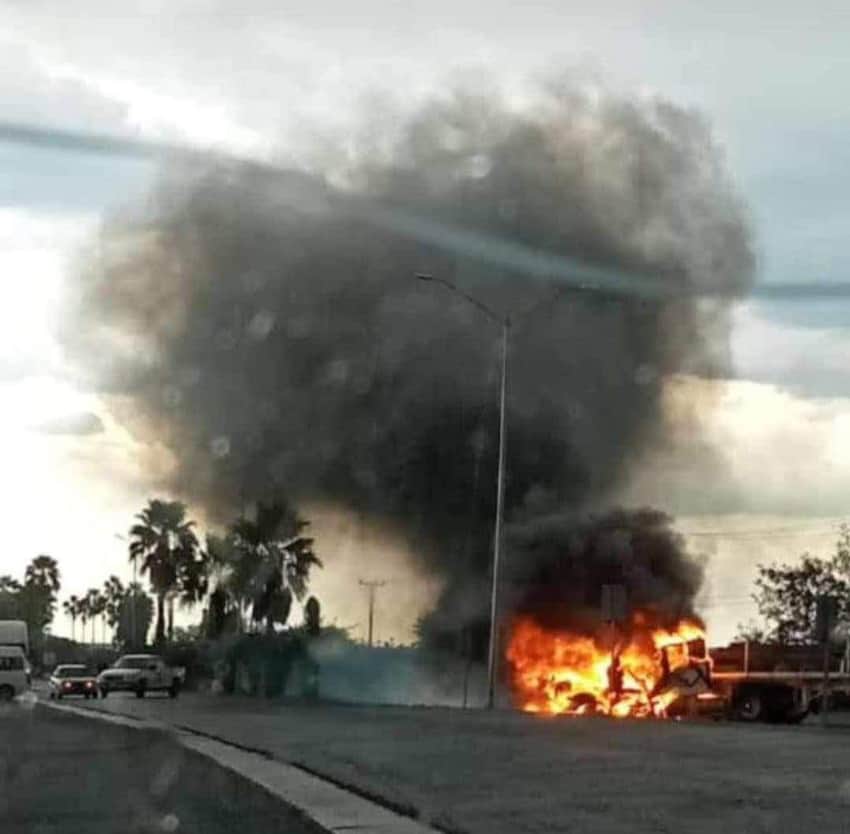
“In Chiapas, we’ve made a lot of progress with the support of the people. The National Guard is there and we hope that normality is reestablished soon,” he said without specifically referring to the murder.
“And in the case of Nuevo León, the same thing, action is already being taken. There’s a confrontation between [crime] groups … and we’re there helping the Nuevo León government in everything we can,” AMLO said, noting that the National Guard and the army are deployed to the state.
López Obrador also said that an investigation is underway into the abduction of seven teenagers in Zacatecas, six of whom were found dead on Wednesday.
“There is one who fortunately is alive, injured,” he said before directing a message to the people of Zacatecas and Nuevo León.
“We’re working in a coordinated way with the local authorities and we’re going to continue combating crime and guaranteeing peace and tranquility, which is our responsibility,” AMLO said.
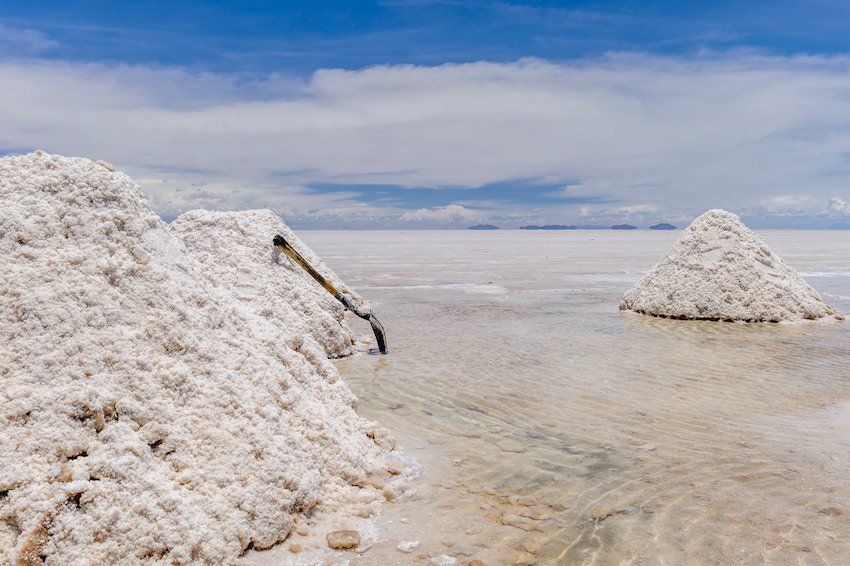
Asked about the reported cancellation of lithium mining concessions held by Chinese company Ganfeng Lithium, López Obrador indicated that a final decision hasn’t yet been made.
The concessions – which were awarded before the 2022 nationalization of lithium – are being reviewed “legally,” he said.
“But we’ve taken the decision that lithium belongs to the nation because it’s a strategic mineral,” López Obrador said.
Later in the presser, the president turned his mind once again to his proposal to have Supreme Court justices and other judges elected by citizens.
“The judicial power will be renewed, I have confidence in that, we just have to do it legally and democratically. We have to wait for the elections,” AMLO said, tacitly acknowledging that the constitutional reform he plans to put forward during his last month as president will require the support of two-thirds of Congress to pass.
The presidential and congressional elections to be held on June 2, 2024, are “extremely important,” Lopez Obrador said.
“It’s not just about electing new authorities, it’s also deciding whether to continue with the process of transformation or not,” he said.
“And who will decide? The people, the citizens, because that’s democracy.”
Near the end of the presser, López Obrador was asked about Grupo Carso’s purchase of 49.9% of the Mexican subsidiary of Talos Energy, which holds a 17.4% stake in the Zama oil field, located in the Gulf of Mexico off the coast of Tabasco.
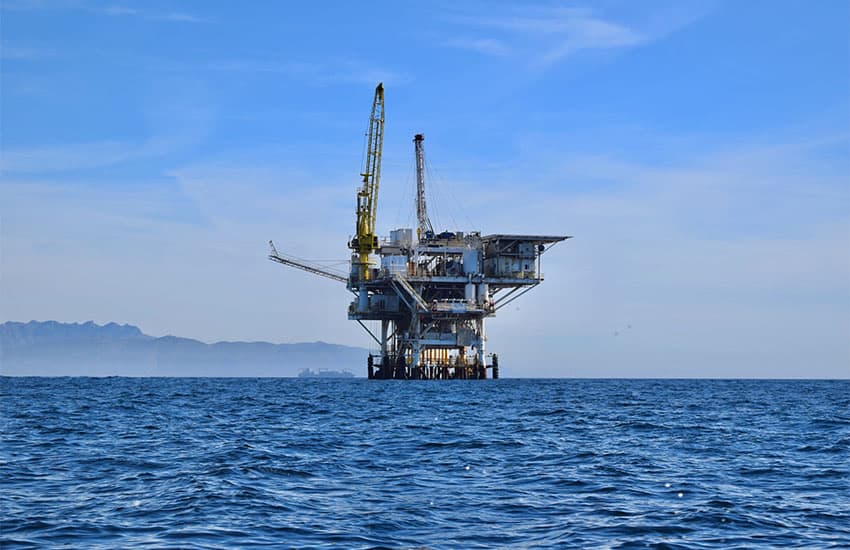
“I believe it’s a good operation,” he said of the purchase by the Carlos Slim-controlled conglomerate.
AMLO proceeded to rail against the previous government’s energy reform that opened up the sector to foreign and private companies. Contracts were granted for 110 onshore and offshore oil fields, but only three are currently producing oil, he said.
“We arrived [in government] and we offered to respect the contracts, and we are. … To deliver those 110 contracts they did the energy reform, they paid off deputies so that they would vote in favor of the energy reform and they deceitfully claimed that foreign investment would pour in and oil production would increase and the price of gasoline would go down. In a nutshell, they lied,” López Obrador said.
“… I didn’t agree with the energy reform, that is known, but once they delivered the contracts I had to take a decision. If we revoked those contracts, it would have generated a lot of instability,” he said.
“… Politics has a lot to do with practical judgment,” López Obrador added.
Friday
At the very beginning of his press conference, AMLO was asked about the United States House of Representatives’ approval of a proposal put forward by a Republican Party lawmaker to cut off some US $60 million in government funding to Mexico due to its alleged lack of willingness to combat fentanyl production and trafficking.
López Obrador dismissed Rep. Alex Mooney’s proposal as electorally-motivated propaganda.
As elections will be held in the United States in 2024, parties and individuals aspiring to elected office use “delicate matters” such as “harm caused by fentanyl” and “the migration issue” for “political purposes,” he said.
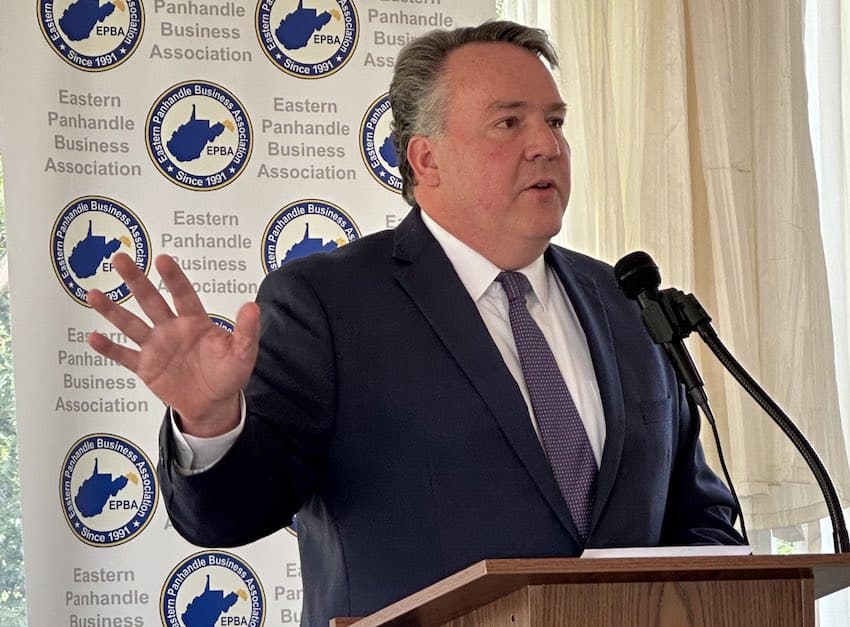
“It’s vile and ordinary propaganda, we shouldn’t take it seriously, it’s just publicity to try to fool United States citizens,” López Obrador said.
As he has done before, AMLO offered some free advice to United States lawmakers about how to combat the fentanyl crisis.
“Attend to your young people guaranteeing them three things: education – education should be free in the United States; work; and thirdly, love, so they don’t use fentanyl. That’s what you should be doing, not blaming us,” he said.
López Obrador also urged the U.S. Congress to approve a support plan for countries in the region with economic, social and political problems that are forcing large numbers of people to leave.
“A comprehensive support plan … so that Venezuelans, Cubans, Nicaraguans, Ecuadorians, Guatemalans, Hondurans don’t have the need to emigrate,” he said.
“They don’t do anything,” AMLO said of U.S. lawmakers before criticizing them for rapidly approving “US $30 or $40 billion for weapons in Ukraine” but ignoring the Western Hemisphere.
“… This is a respectful recommendation: approve a well-being support plan for the people of Latin America and the Caribbean,” he said.
López Obrador later said that he agreed with Elon Musk’s call for “expedited legal approval” of entry to the United States for “hard-working and honest” migrants.
Given that there is a labor shortage in the United States, having an “anti-immigrant policy is very hypocritical,” he asserted.
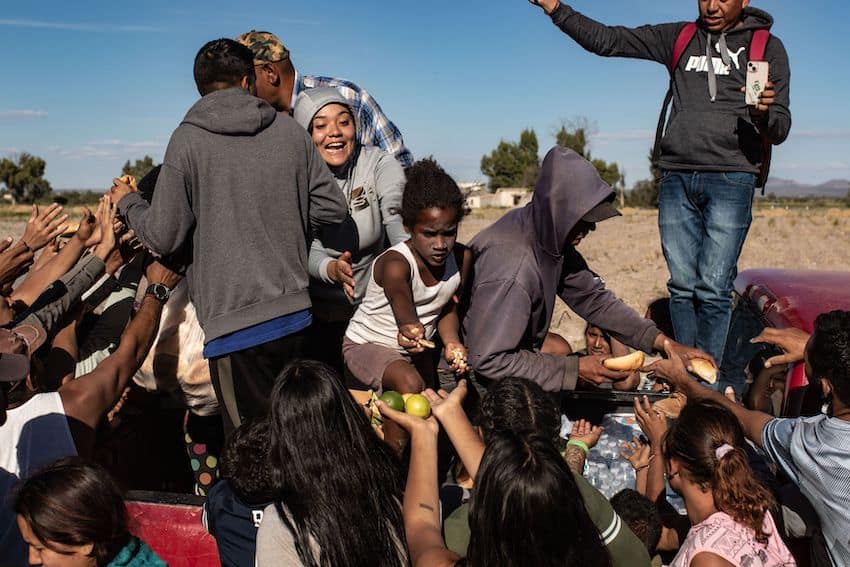
In a change of topic, a reporter – after remarking that at least 50 Asian companies are thinking about investing in factories in Mexico – asked the president “what certainty” he could give to firms considering relocation.
“There is investment in Mexico from the entire world, investment is coming in from all over the world, mainly from the United States and Canada, but there are conditions to invest in Mexico,” López Obrador said.
“You already know what happened with Mr. Musk’s company,” he said, referring to Tesla’s decision to build a “gigafactory” in Nuevo León.
“All the facilities for investment were provided and progress is being made. … In Mexico there are very favorable conditions for investment,” AMLO said.
Later in the mañanera, a reporter asked the president what his government could do to protect journalists, dozens of whom have been murdered in recent years.
“Well, we have to continue combating crime, continue working to avoid violence, everything we’re doing,” López Obrador said.
“… If you ask me, ‘What can we do to guarantee the protection of journalists, social activists and all people?’ [I say] continue attending to the causes of violence,” he said.
AMLO asserted that his government “punishes culprits when there are murders of journalists.”
“In the majority of cases … during our government,” suspects have been arrested and imprisoned, he said, adding: “there is no impunity, impunity is not permitted.”
Shortly before the end of his presser, López Obrador said that he would soon begin announcing replacements for officials who have decided to resign to seek elected office, among whom are Deputy Health Minister and COVID czar Hugo López-Gatell, who is hoping to stand as the ruling Morena party candidate at the 2024 Mexico City mayoral election, and the head of the consumer protection agency Profeco, Ricardo Sheffield, who has his eyes on the governorship of Guanajuato.
“I’ll announce [the replacements] here, starting Monday,” he said.
“… Let’s have breakfast now,” AMLO declared before noting that he was about to embark on a tour of México state.
“Where are we going? Let’s see, to Tecámac first and then to Ecatepec. Tomorrow we’re going to Texcoco and Chimalhuacán and then to Chalco, Valle de Chalco first, then to Chalco and Ixtapuluca,” he said, mentioning no fewer than seven municipalities in Mexico’s most populous state.
By Mexico News Daily chief staff writer Peter Davies (peter.davies@mexiconewsdaily.com)
